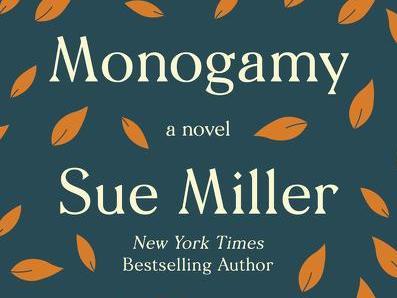
BOOK REVIEW: A Widow Discovers That Her Marriage Wasn’t ‘Monogamy’
LISTEN
BY MAUREEN CORRIGAN
I’ve been reading and reviewing Sue Miller’s novels ever since her debut, The Good Mother, became an instant bestseller in 1986. And for all those many years, I’ve been frustrated by Miller because her novels are so hard to do justice to in a review, especially on radio.
As you know, radio is about storytelling and Miller’s stories, in summary, often tend to sound contrived, cheesy even. For instance, her latest novel, Monogamy, is about a couple living in Cambridge, Mass., who’ve been happily married nearly 30 years; the husband suddenly dies and the wife discovers he had been having an affair. Her known world is, thus, doubly shattered.
Melodramatic, right? Yet, in Miller hands, this piece of artifice becomes transformed into felt life. She’s one of our most emotionally profound and nuanced writers.

Monogamy, by Sue Miller
Annie, the “wife,” in Monogamy, is the first character we meet and, the one we readers are left with after her husband, Graham, dies in his sleep of a heart attack. In her 60s — a photographer who has had some successful exhibitions, but by her own admission, is no Diane Arbus — Annie is one of those reserved, easy-to-underestimate people with a strong core.
On the first page of Monogamy, we learn about Annie’s first marriage out of college to a smug preppy named Alan whose sophisticated “careless contempt” for other people Annie initially enjoyed. Here’s how Miller, in the space of a few discerning sentences, draws readers in, as Annie reflects on the breakdown of that marriage:
Soon enough, though, as she might have foreseen, Alan’s disdain turned to her. To her life, to her useless preoccupations — she was taking course after course in photography at the Museum School then. To her pitiful income (she did portraits of dogs for their owners …) … To her self-delusions (she kept sending off photographs of local events to The Phoenix, to The Boston Globe, …) …
It was when she was driving home with [Alan] from a party, a party he was speaking of in that familiar, slightly irritated tone, that it occurred to her that she simply didn’t like him.
This appetizer of an anecdote about Annie’s early history is a prelude to the big moment of reversal when Annie, after Graham’s sudden death, learns in a subtle yet intrusive way of his affair and her love for him vanishes — at least for a time.
But, unruly Graham himself, even after his death, monopolizes everyone’s attention here. One of Miller’s crucial adjectives in Monogamy is “expansive,” and Graham himself is an expansive, physically big man, filled with gusto for food, wine, books and, it must be acknowledged, sex. He owns a bookstore in Cambridge — a hub for the community. There’s a price, however, to being in Graham’s charmed orbit. In a flashback scene in this novel, whose meaning will echo out, one of Graham’s oldest friends tells him: “You ask too much of other people. … Forbearance, I guess. If not forgiveness.”
Miller’s narrative contains lots of such flashback moments, because memory itself is one of her preoccupations here: how the past shifts and our sense of people and conversations, as well as our own behavior, becomes newly open to interpretation. A vivid cast of supporting characters, each with their own takes on Graham and Annie, help open out the novel: among them, Graham’s first wife, Frieda, a teacher who never stopped loving him, as well as Graham and Annie’s adult daughter, Sarah, whose plainness and social isolation growing up was a source of pain to her parents. Here’s Sarah, as an adult, still carrying those adolescent scars, in conversation with a man she’s interested in:
“He was smiling, flirting with her. And here it came, the question that often arose for Sarah with men. Was it the kind of flirting other guys had sometimes done with her, the kind of flirting based on the assumption that she would see it for what it was — essentially a joke? … Or was it real?”
Monogamy is deliciously thick with such arresting psychological perceptions. As Annie struggles with her grief and postmortem shock at Graham’s infidelity, Miller keeps deftly shifting what we readers might anticipate to be the ending of this novel.
I may be overreaching, but the deeper I got into Monogamy, and especially when I arrived at its lyrical final pages, the more the novel made me think of the “The Dead,” James Joyce’s short story masterpiece about a man whose sense of his marriage is radically changed by one fateful moment. Both narratives end on a snow-silenced night haunted by ghosts — ghosts who are out of reach, but still, maddeningly, messing with the living.
9(MDAyOTk4OTc0MDEyNzcxNDIzMTZjM2E3Zg004))















